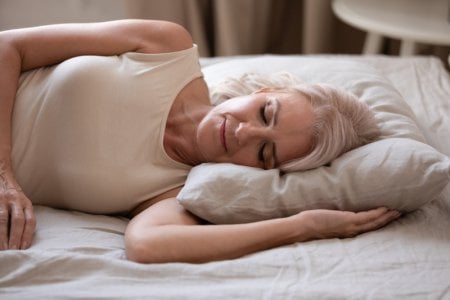Do you want to boost your memory and happiness as you age? There's one simple thing you can do!
- Replies 6
We all know that as we get older, our sleeping habits, daily routines and bodies change. However, according to a new study published in JAMA Psychiatry, there are some lifestyle tweaks we can make as we age that are associated with not only better cognition but mental health too. The study focused on the relationship between sleep, memory and happiness.
First and foremost, it’s important to understand that the researchers wanted to look at lifestyle factors and activities in older adults and whether those things were linked with health factors i.e. does good sleep actually lead to good health? To do so, they had 1,800 adults with an average age of 73, wear wrist monitors for a week to get a sense of their activity levels. The participants also filled out questionnaires that assessed mental health and cognition.
Now, it’s important to understand that the researchers didn’t define ‘activity’ as only ‘physical activity’, but rather any activity that was stimulating: meeting a friend for a coffee, taking a nice walk around the block, trying to work out a riddle, or even going to a place of worship.
What they found is that it appears adults who have an ‘early rising/robust pattern,’ aka waking up before 7am and staying active during the day did better on their cognition assessments and had better mental health than the participants whose daily schedules were less ‘robust’.
The participants who were going to bed later and had less activity during the day were found to have rates of cognitive impairment as well as being more likely to suffer from significant depressive symptoms.
It is important to note that the research states that these findings are correlative not necessarily a sign of causation i.e. just because you get up after 7am doesn’t mean you’re guaranteed to have poorer cognition assessments and mental health. The lead researcher, Stephen Smagula, noted ‘the relationship between sleep, activity levels, and mental health could go both ways’. (As in, poorer mental health and/or cognition can influence your sleep and activity, and vice versa.)
Whatever way you look at the research, it is clear that staying active and engaged in activities – whether that’s physical, social, spiritual or other – and getting quality sleep is the key to staying healthy. It also does seem like those who get up a little earlier, are getting better quality sleep, so why not try getting up a little earlier tomorrow, and seeing how that improves your sleep the following night? It can be your own little science experiment!
First and foremost, it’s important to understand that the researchers wanted to look at lifestyle factors and activities in older adults and whether those things were linked with health factors i.e. does good sleep actually lead to good health? To do so, they had 1,800 adults with an average age of 73, wear wrist monitors for a week to get a sense of their activity levels. The participants also filled out questionnaires that assessed mental health and cognition.
Now, it’s important to understand that the researchers didn’t define ‘activity’ as only ‘physical activity’, but rather any activity that was stimulating: meeting a friend for a coffee, taking a nice walk around the block, trying to work out a riddle, or even going to a place of worship.
What they found is that it appears adults who have an ‘early rising/robust pattern,’ aka waking up before 7am and staying active during the day did better on their cognition assessments and had better mental health than the participants whose daily schedules were less ‘robust’.
The participants who were going to bed later and had less activity during the day were found to have rates of cognitive impairment as well as being more likely to suffer from significant depressive symptoms.
It is important to note that the research states that these findings are correlative not necessarily a sign of causation i.e. just because you get up after 7am doesn’t mean you’re guaranteed to have poorer cognition assessments and mental health. The lead researcher, Stephen Smagula, noted ‘the relationship between sleep, activity levels, and mental health could go both ways’. (As in, poorer mental health and/or cognition can influence your sleep and activity, and vice versa.)
Whatever way you look at the research, it is clear that staying active and engaged in activities – whether that’s physical, social, spiritual or other – and getting quality sleep is the key to staying healthy. It also does seem like those who get up a little earlier, are getting better quality sleep, so why not try getting up a little earlier tomorrow, and seeing how that improves your sleep the following night? It can be your own little science experiment!








